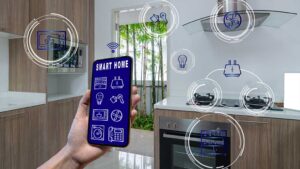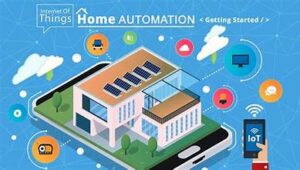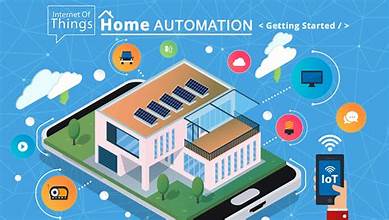
The landscape of smart home technology is evolving at an unprecedented pace, driven by advancements in artificial intelligence (AI). As we move into 2024, the integration of AI into home automation is set to redefine how we interact with our living spaces, making them more intuitive, efficient, and responsive. This article explores the future of smart home technology, highlighting how AI is revolutionizing home automation and what homeowners can expect in the near future.
The Rise of Smart Home Technology
Smart home technology has come a long way since the early days of basic home automation systems. Initially, these systems were limited to controlling lights and thermostats through remote controls or timers. Today, smart home technology encompasses a wide range of devices and systems that can be controlled remotely, learn user preferences, and even anticipate needs.
In 2024, smart home technology is expected to become even more sophisticated, with AI playing a crucial role in its evolution. AI algorithms are now capable of processing vast amounts of data from various sensors and devices to create a seamless and personalized home automation experience.
AI’s Role in Home Automation
Artificial intelligence is transforming home automation in several key ways:
1. Enhanced Personalization
AI-powered smart home systems are capable of learning from user behavior and preferences. For example, a smart thermostat can analyze your daily routines, such as when you wake up and leave for work, to adjust the temperature automatically for optimal comfort and energy efficiency. Over time, these systems become more adept at predicting your needs, providing a highly personalized experience.
2. Voice and Gesture Control
Voice assistants like Amazon’s Alexa, Google Assistant, and Apple’s Siri have become central to smart home interactions. In 2024, AI will further enhance voice recognition and natural language processing, allowing for more accurate and context-aware responses. Additionally, gesture control technology, enabled by AI, will allow users to interact with their smart home devices through simple hand movements or other gestures, offering a more intuitive and hands-free experience.
3. Predictive Maintenance
AI can predict when a device or system is likely to require maintenance or repair. By analyzing usage patterns and performance data, AI can identify potential issues before they become serious problems. For instance, a smart washing machine might alert you to a potential issue with its components before it actually breaks down, minimizing downtime and repair costs.
4. Improved Security
AI-driven security systems are becoming more advanced, incorporating facial recognition, motion detection, and anomaly detection to enhance home security. These systems can distinguish between regular activities and unusual behavior, sending alerts only when necessary. For example, an AI-powered security camera can differentiate between a family member returning home and an unfamiliar visitor, reducing false alarms and improving overall security.
5. Energy Efficiency
AI can optimize energy consumption by analyzing data from smart meters and appliances. For instance, smart lighting systems can adjust brightness based on natural light levels and occupancy, while AI algorithms can identify patterns in energy usage to suggest ways to reduce consumption. This not only helps in lowering utility bills but also contributes to environmental sustainability.
The Future of Smart Home Integration
As we look ahead, several trends are likely to shape the future of smart home technology:
1. Interoperability
One of the biggest challenges in smart home technology has been the lack of interoperability between different devices and platforms. In 2024, we can expect more standardized protocols and platforms that will allow various smart devices to work seamlessly together. This will enable users to create more integrated and cohesive smart home environments.
2. AI-Driven Ecosystems
AI will play a central role in creating interconnected smart home ecosystems. Rather than having isolated smart devices, future homes will feature AI-driven hubs that integrate and coordinate all smart devices, ensuring they work together harmoniously. This will simplify the user experience and enhance the overall functionality of smart home systems.
3. Enhanced Privacy and Security
With the increased reliance on AI, concerns about data privacy and security will be paramount. In 2024, there will be a stronger focus on developing secure AI algorithms and protocols to protect user data. Smart home manufacturers will need to address these concerns transparently and provide users with control over their data.
4. Affordable and Accessible Technology
As technology advances, the cost of smart home devices is expected to decrease, making them more accessible to a broader audience. The democratization of AI-driven home automation will allow more people to benefit from the convenience and efficiency of smart home technology.
Practical Applications and Examples
To illustrate how AI is revolutionizing home automation, let’s explore a few practical applications:
1. Smart Kitchen Appliances
In the modern kitchen, AI-powered appliances are making meal preparation easier and more efficient. For example, smart ovens can recognize the type of food being cooked and adjust the temperature and cooking time accordingly. AI-driven refrigerators can track inventory, suggest recipes based on available ingredients, and even order groceries when supplies are low.
2. Intelligent Lighting Systems
Smart lighting systems equipped with AI can adjust brightness and color temperature based on the time of day, user preferences, and activities. For example, the lighting system can automatically dim the lights in the evening for a relaxing ambiance and brighten them in the morning to simulate a natural sunrise, helping to regulate circadian rhythms.
3. Home Health Monitoring
AI-driven health monitoring systems are becoming an integral part of smart homes, especially for elderly or vulnerable individuals. These systems can track vital signs, detect falls, and even remind users to take medications. AI algorithms analyze health data to provide alerts to caregivers or medical professionals in case of any abnormalities.
Conclusion
The future of smart home technology in 2024 is set to be shaped by the transformative power of AI. From enhanced personalization and predictive maintenance to improved security and energy efficiency, AI is revolutionizing home automation in ways that were once considered science fiction. As technology continues to evolve, we can expect even more innovative and user-friendly solutions that will make our homes smarter, safer, and more efficient.




